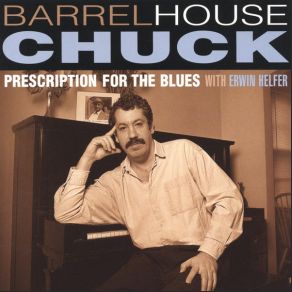Prescription for the Blues
Download links and information about Prescription for the Blues by Barrelhouse Chuck. This album was released in 2002 and it belongs to New Age, Blues genres. It contains 16 tracks with total duration of 44:45 minutes.

|
|
|---|---|
| Artist: | Barrelhouse Chuck |
| Release date: | 2002 |
| Genre: | New Age, Blues |
| Tracks: | 16 |
| Duration: | 44:45 |
| Buy it NOW at: | |
| Buy on iTunes $9.99 | |
| Buy on Amazon $8.99 | |
Tracks
[Edit]| No. | Title | Length |
|---|---|---|
| 1. | Sitting On Top of the World | 2:26 |
| 2. | My Own Lonesome Blues | 3:10 |
| 3. | Mean Mistreater Mama | 3:00 |
| 4. | Tin Pan Alley | 3:14 |
| 5. | Double D | 1:18 |
| 6. | Prescription for the Blues - With Erwin Helfer (featuring Erwin Helfer) | 3:50 |
| 7. | Going Back to Memphis | 1:44 |
| 8. | Ain't Times Hard | 2:56 |
| 9. | Corrine, Corrina | 2:42 |
| 10. | Straight Alky Blues | 3:44 |
| 11. | Nutty Boogie - With Erwin Helfer (featuring Erwin Helfer) | 1:29 |
| 12. | Johnson Machine Gun | 3:19 |
| 13. | Barrelhouse Woman | 3:18 |
| 14. | Ain't Nobody's Business - With Erwin Helfer (featuring Erwin Helfer) | 4:10 |
| 15. | Yamato Stomp | 2:00 |
| 16. | Rooster's Blues | 2:25 |
Details
[Edit]Chicago is home base for many of the top (but not necessarily well-known) piano blues (also boogie-woogie) artists in the country. The Sirens Records seems determined to document as many of them on disc as possible. This The Sirens CD features Barrelhouse Chuck (aka Chuck Goering), who gets a little help from his friend Erwin Helfer on three tracks. If any jazz style can make a piano wail and talk, it's piano blues. Listen to it talk about trials and tribulations on such cuts as "Mean Mistreater Mama" and "Tin Pan Alley." Although self-taught, Goering clearly comes under the stylistic influences of such leading practitioners of this art as Sunnyland Slim, Pinetop Perkins, Muddy Waters, and more, while his signing finds derivation in Little Brother Montgomery. Of the three tracks with Helfer, "Prescription for the Blues," where Helfer plays and Goering sings, is the "bluest" of the bunch. Modified boogie-woogie comes to the fore with "Barrelhouse Woman" when the singer, like thousands of blues singers before him, tries to set his woman straight with the same amount of success as had his predecessors. But it's great piano even if it's wishful thinking. Every jazz fan should periodically listen to this style to get a feel for the pathos and emotion that jazz can generate, as well as to revel in the amazing talent these players pack. They can shift between the up-tempo, such as "Nutty Boogie," and the slow drag, both pianistically and vocally, as if there is nothing to it. These artists offer a perspective on jazz that gets too little recognition in these days of high-tech, "let's merge jazz, rock, and adult contemporary" gimmickry too often foisted on the public by the record companies. Keep 'em coming, The Sirens!